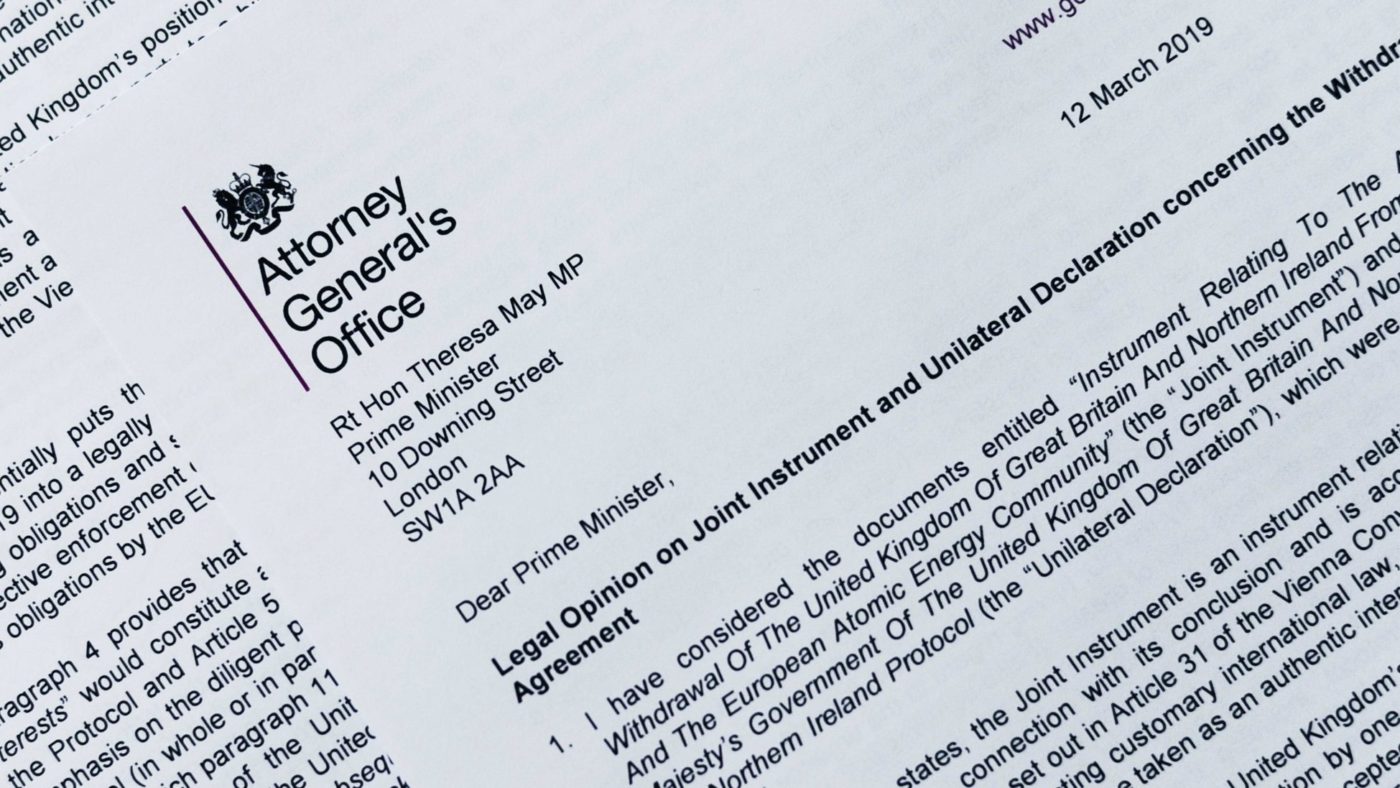The updated legal advice from the Attorney General, Geoffrey Cox, has been pronounced as the death knell for the Government’s chances of winning tonight’s meaningful vote.
Journalists, commentators and MPs pounced on Paragraph 19 of the advice, which states that the “legal risk remains unchanged” since Cox’s last set of advice was published. Predictably, many Labour MPs (who were never going to vote for the deal anyway) use May’s own words to crow that “nothing has changed”. Hardline Brexiteers, meanwhile, conclude that the UK could still be “trapped” in the backstop, as there is, in the AG’s words, “no internationally lawful means of exiting the Protocol’s arrangements, save by agreement”.
However, there is much more to the legal advice than just one paragraph, and it needs to be considered in the round.
Paragraph 14, for example, calls the recently agreed Joint Instrument a “substantive and binding reinforcement” of the UK’s legal rights on the backstop. And Paragraph 17 makes clear that the Instrument reduces the risk the UK could be kept “indefinitely and involuntarily” in the backstop, as a result of “the bad faith or want of best endeavours of the EU”.
The legal risk which Paragraph 19 says “remains unchanged” is a specific one – it refers to a situation in which both the UK and EU have demonstrated good faith in negotiations, but are unable to agree on an alternative to the backstop “because of intractable differences”. It is difficult to see how any legal document published now could prevent “intractable differences” from ever emerging at any point. The future is the future, and cannot be pre-determined now.
At this point, it is important to remember that the backstop applies “unless and until” it is replaced by a future relationship which also avoids a hard border in Ireland. Part of the problem stems from the EU’s apparent reluctance thus far to consider proposals to keep the border open other than a customs union – such as facilitation and technology.
Brexiteers fear that the EU would perfidiously keep the UK trapped in the backstop against its will by refusing to agree to alternatives, despite the fact that workable “alternative arrangements” were ready to replace it. But the legal advice makes clear that this risk has been reduced significantly, as a “systematic refusal to take into consideration adverse proposals” would constitute a breach of good faith and therefore give the UK the opportunity to suspend the backstop via arbitration.
The upshot of this is that the UK can only be “trapped” in the backstop against its will if leaving the backstop would cause a hard border in Ireland. The main hurdle now to exiting the backstop in the future will be the UK’s ability to demonstrate to independent arbitrators that “alternative arrangements” actually work. Indeed, it is telling that the largest Irish opposition party, Fianna Fail, say they are “extremely concerned” by Cox’s legal advice – precisely because they think it makes it easier for the UK to leave the backstop.
It has long been clear that the EU was never going to agree to a unilateral exit mechanism to the backstop that allowed the UK to trigger No Deal and a hard border; any solution to the Irish question will self-evidently require negotiation. Significantly, however, the Joint Instrument makes clear that “alternative arrangements” would not need to replicate the backstop – indeed, it makes explicit reference to technology and other facilitative arrangements favoured by Brexiteers, and establishes a joint work stream to explore such arrangements as soon as the UK leaves. This directly addresses fears that the EU would only agree to replace the backstop with something substantively the same, such as a customs union.
Ultimately, despite significant new legal safeguards, the political reception the Attorney-General’s advice has received means the deal will not pass tonight – though questions remain over the margin of defeat. The 109 pro-Brexit Conservatives who voted against the deal last time are split; moderates are moving towards the deal, while hardliners are standing firm. The DUP’s decision not to back the revised deal is a huge blow, as many Conservatives were taking their cues from them; the same is true of the judgment by the so-called ‘Star Chamber’ of pro-Brexit lawyers led by Bill Cash.
Nevertheless, as the Attorney General points out, voting on the deal is ultimately a political question rather than a legal one. It is increasingly clear that if Brexiteers vote down the deal, their position will get worse rather than better. The Commons will certainly vote against No Deal tomorrow, and – most likely – for an extension to Article 50 on Thursday. If Brexit is delayed, what happens next is anyone’s guess. The advantage in Parliament will likely be handed not to the dwindling band of pure Brexiteers, but to other groups of MPs who favour continued delay, a softer Brexit, or no Brexit at all.
CapX depends on the generosity of its readers. If you value what we do, please consider making a donation.


